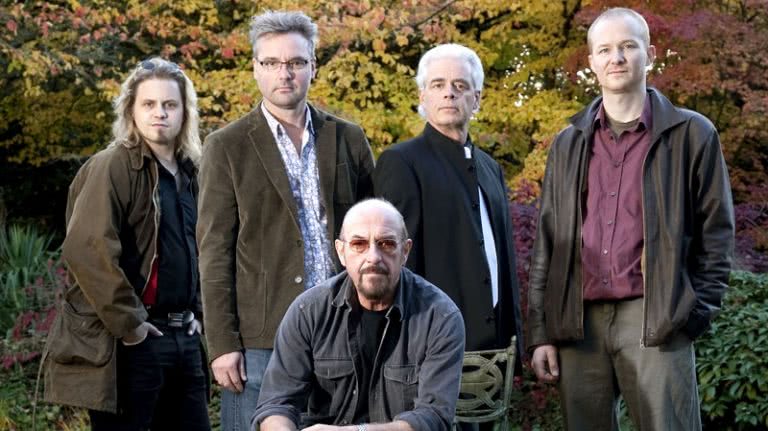Over the last, say, 60 years, we have witnessed plenty of attempts by musicians trying to reinvent themselves. The reasons for this are legion – sheer commercial incentive, the necessity to alter your performance to suit venues, fickle fans – but surely exasperation at playing the same old sound must be close to the top.
Ian Anderson found a rather savvy way to sidestep this from the very beginning. During his days as frontman of Jethro Tull (not familiar? Picture the silhouette of a crazed pirate flautist standing on one leg) and on through his solo career, Anderson has simply never settled for one kind of music.
It must be said that talking to him is an exhaustive pleasure. His answers cover so much ground that it’s hard to keep track of where your question began, and where his freewheeling reminiscence has led you. Conversation is casually littered with the great names of music, and it’s worth noting this is no idle showboating; Anderson has featured right alongside them.
“From the very beginning,” he explains, “I had more of a track record of never staying in one place but always trying something different. Maybe a good example is David Bowie, who commanded people’s attention but never fell into the trap of repeating himself, or repeating the same character or identity, the same vocal style. I mean, Bowie has an incredible vocal range; he was a very good singer. Still is, likely, though these days, like much of his life, he tends to focus on the Bing Crosby/Frank Sinatra range, and that’s understandable.
“As you get older your voice thickens, becomes darker. You perhaps become more suited to some of your work more than others. That’s part of the reason Robert Plant doesn’t carry on with the Led Zeppelin reunion idea. Recognising that it’s hard to do those songs in the same way, you’ll be constantly compared with your younger self. People will be very harsh with those things. Jimmy [Page] and the other guys can just stand about and strum a guitar a bit, that’s all you have to do. But the singer, it’s the whole physical deal, and I think Robert has likely moved on with his life, his music and his fans. He hasn’t persevered with that, the same way as [people] like Sting, who chose to go their own ways after a couple of years of being with hugely successful bands. How long will it be until Chris Martin decides enough is enough with Coldplay and wants to start something new?”
Though 11 years have passed since Jethro Tull released their final record (and almost five decades since their first), their legacy as one of the world’s foremost progressive rock bands is unlikely to fade anytime soon, thanks in no small part to Anderson’s involvement and continued solo output. His regret, however, is not paying closer attention when it came to choosing a name.
“I’ve always felt a little embarrassed and awkward about the name Jethro Tull,” he chuckles, “especially after I discovered we were named after a dead guy who invented the seed drill. I didn’t really give it that much thought at the time and after three or four weeks, well, that was the name we were stuck with. The fact it was somebody else’s name, that’s what really bothered me. It’s a bit like being called Robin Hood. If it’s something historical, that might have some useful reference for people in suggesting a certain character, a certain time, a certain context that might be applicable to the music you’re playing. But it didn’t really have much to do with us at all, unfortunately.”
In the days surrounding this conversation The Rolling Stones have been swinging from stadium to stadium here in Australia (sorry, Broken Hill). After a lengthy discussion about the trajectory of the Stones’ music (“I don’t think Jagger has had the credit due to him having tried to push the boundaries a little bit,” Anderson says, “but at the same time he recognises that ultimately his legacy is as the guy with the not-so-big-anymore lips and the skinny legs jumping around stages,”), he reminisces about his 1968 performance in The Rolling Stones Rock And Roll Circus. Having played alongside the likes of The Who and The Dirty Mac (a group featuring such names as John Lennon and Eric Clapton), Anderson says the memory remains a touchstone of his early days.
“At the beginning I was quite conscious of being part of something really big and probably quite important. I guess in the middle period [of your career] you tend to just put that behind you and get on with whatever you’re doing today, and not really think about the context. Later in life you’ll go back to that again and re-evaluate your position, the people you’ve met and worked with, the people whose stage you’ve shared as a support band or lowly beginner. In the beginning and end you’re certainly aware of the great moments that you’ve had, the opportunities, including the ones you’ve missed.
“If you ask me what those were, the answer is, I can’t think of any off the top of my head. But not playing at Woodstock was not one of them.” He laughs. “The way I see it now, I think that was a very wise career move.”
Ian Anderson Presents The Best Of Jethro Tull atConcert Hall, Sydney Opera House onThursday December 11 and Friday December 12, tickets online.

































